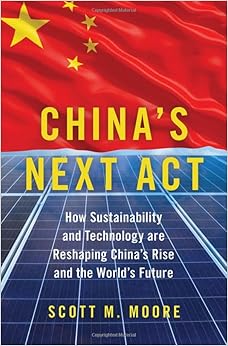Book Bits: Heroes And Villains

● China’s Next Act: How Sustainability and Technology are Reshaping China’s Rise and the World’s Future
Scott M. Moore
Summary via publisher (Oxford U. Press)
In China’s Next Act, Scott M. Moore re-envisions China’s role in the world, with a focus on sustainability and technology. Moore argues that these increasingly pressing, shared global challenges are reshaping China’s economy and foreign policy, and consequently, cannot be tackled without China. Yet sustainability and technology present opportunities for intensified economic, geopolitical, and ideological competition–a reality that Beijing recognizes. The US and other countries must do the same if they are to meet ecological and technological challenges in the decades ahead. In some areas, like clean technology development, competition can be good for the planet. But in others, it could be catastrophic — only cooperation can lower the risks of artificial intelligence and other disruptive new technologies.
● The Tragic Science: How Economists Cause Harm (Even as They Aspire to Do Good)
George F. DeMartino
Summary via publisher (Chicago U. Press)
The practice of economics, as economists will tell you, is a powerful force for good. Economists are the guardians of the world’s economies and financial systems. The applications of economic theory can alleviate poverty, reduce disease, and promote sustainability. While this narrative has been successfully propagated by economists, it belies a more challenging truth: economic interventions, including those economists deem successful, also cause harm. Sometimes the harm is manageable and short-lived. But just as often the harm is deep, enduring, and even irreparable. And too often the harm falls on those least able to survive it.
● Going Public: How Silicon Valley Rebels Loosened Wall Street’s Grip on the IPO and Sparked a Revolution
Dakin Campbell
Review via Publishers Weekly
Campbell, Business Insider’s chief financial correspondent, delivers a thorough if dry history of the initial public offering and its evolution as tech companies became a bigger chunk of the market. He begins with technology companies’ IPOs during the ’60s and goes on to profile such luminaries as Bill Hambrecht of Francis I. DuPont & Co., an investment banker who popularized the OpenIPO model in the late ‘90s, which allowed the public to purchase shares “more equitably.” Campbell discusses how the market changed when Spotify listed shares directly on the exchange in 2018, which “fashion[ed] a new role for investment banks that kept them at arm’s length,” and Slack later modeled its listing after Spotify’s.
● A Herstory of Economics
Edith Kuiper
Summary via publisher (Polity)
There were only a few women economists who made it to the surface and whose voices were heard in the history of economic thought of Adam Smith, David Ricardo, John Maynard Keynes, and Milton Friedman – right? Wrong!In this book, distinguished economist Edith Kuiper shows us that the history of economic thought is just that, a his-story, by telling the herstory of economic thought from the perspective of women economic writers and economists. Although some of these women were well known in their time, they were excluded from most of academic economics, and, over the past centuries, their work has been neglected, forgotten, and thus become invisible.
● Profit from the Source: Transforming Your Business by Putting Suppliers at the Core
Christian Schuh, et al.
Review via The Wall Street Journal
Long before the Covid-19 pandemic, trade in manufactured goods was losing steam. The shift to giant container ships, perpetually running behind schedule, had made freight transport less reliable. Natural disasters in one country forced factories to close in another. Trade disputes blocked the flow of imports. When such risks were priced in, complex international supply chains often failed to deliver the bargains sought by corporate bean counters whose main concern was cutting costs.
In “Profit From the Source,” four Europe-based partners at Boston Consulting Group—Christian Schuh, Wolfgang Schnellbächer, Alenka Triplat and Daniel Weise—make the case for drastic change. Procurement, they assert, has been badly neglected: “When the boss offers someone a job in procurement, they know they’re on the fast track to nowhere.” Top executives, they claim, spend far too little time with suppliers, even though purchasing swallows more than half of the average company’s budget. “That’s a mismatch with potentially existential consequences,” they write. Instead, they insist, companies should put procurement at the center of corporate strategy.
Please note that the links to books above are affiliate links with Amazon.com and James Picerno (a.k.a. The Capital Spectator) earns money if you buy one of the titles listed. Also note that you will not pay extra for a book even though it generates revenue for The Capital Spectator. By purchasing books through this site, you provide support for The Capital Spectator’s free content. Thank you!
More By This Author:
Arguing Over Recession Definitions
Peak Inflation Watch - Thursday, July 28
Energy Holds On To Hefty Lead For US Equity Sectors In 2022
Disclosures: None.







